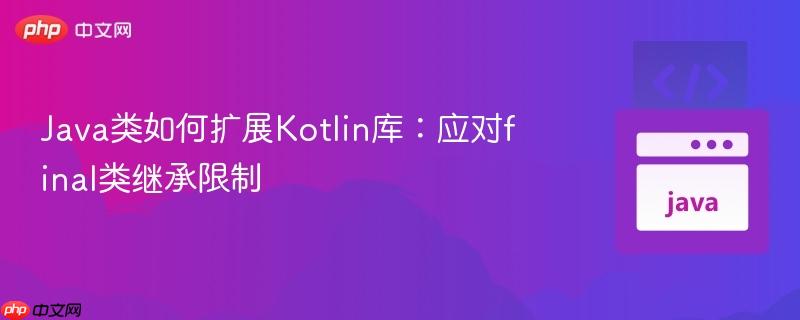
本文探讨了Java类扩展Kotlin库时遇到的`final`类继承限制问题。默认情况下,Kotlin类是`final`的,阻止了Java的直接继承。教程提供了两种解决方案:如果可以修改库,使用`open`关键字开放Kotlin类;如果无法修改,则推荐采用组合(Composition)模式,通过封装和委托实现功能扩展,避免继承限制。
1. 理解Kotlin的默认final行为及其对Java继承的影响
Kotlin的设计哲学之一是默认情况下限制继承,以鼓励组合、提高代码稳定性并减少意外的副作用。这意味着在Kotlin中,所有的类和方法默认都是final的,除非显式地使用open关键字进行声明。
当一个Java类尝试继承一个默认的Kotlin类时,编译器会报告错误,例如Cannot inherit from final。这是因为Java的继承机制要求被继承的类必须是可扩展的,而Kotlin的final属性阻止了这一点。对于外部库,如果其Kotlin类没有被声明为open,那么Java代码将无法直接通过extends关键字来重写其方法或扩展其功能。
考虑以下Kotlin库中的类:
立即学习“Java免费学习笔记(深入)”;
// EditorLibrary.kt (Kotlin)
package com.example.library
class EditorLibrary { // 默认是final的
fun editContent(content: String): String {
return "Edited: $content"
}
}如果Java类尝试继承它:
// Editor.java (Java)
package com.example.app;
import com.example.library.EditorLibrary;
public class Editor extends EditorLibrary { // 编译错误: Cannot inherit from final
// ... 尝试重写方法或添加新功能
}这会导致编译错误,因为EditorLibrary默认是final的。
2. 方案一:开放Kotlin类以允许继承 (适用于库可控场景)
如果你拥有Kotlin库的源代码控制权,并且希望允许其他类(包括Java类)继承和扩展其功能,那么最直接的解决方案是使用open关键字显式地将Kotlin类或方法声明为可开放的。
open关键字告诉Kotlin编译器,这个类或方法是设计用于被继承和重写的。
// EditorLibrary.kt (Kotlin)
package com.example.library
open class EditorLibrary { // 使用open关键字,允许被继承
open fun editContent(content: String): String { // 方法也需要open才能被重写
return "Edited: $content"
}
fun anotherMethod() { // 默认是final的,不能被重写
println("Another method in EditorLibrary")
}
}一旦EditorLibrary被声明为open,Java类就可以成功继承它并重写其open方法:
// Editor.java (Java)
package com.example.app;
import com.example.library.EditorLibrary;
public class Editor extends EditorLibrary {
@Override
public String editContent(String content) {
// 在父类功能基础上添加自定义逻辑
String originalEdited = super.editContent(content);
return "Custom " + originalEdited;
}
public void newEditorFeature() {
System.out.println("New feature in Editor");
}
}这种方法简单直接,但前提是你能够修改Kotlin库的源代码。
3. 方案二:采用组合模式 (适用于库不可控场景)
在许多情况下,你可能无法修改第三方Kotlin库的源代码,这意味着你无法将目标类声明为open。在这种情况下,组合(Composition)优于继承的设计原则提供了一个优雅的解决方案。
组合模式的核心思想是:与其直接继承一个类来获取其功能,不如在一个新类中包含(即“拥有”)该类的一个实例,并通过委托(Delegation)来暴露或增强其功能。
实现步骤:
- 创建一个新的Java类,该类不继承Kotlin库的final类。
- 在新类中声明一个私有字段,其类型为Kotlin库的final类,并初始化它。
- 在新类中创建公共方法,这些方法可以调用内部Kotlin库实例的相应方法,并可以在此基础上添加额外的逻辑。
示例:
假设EditorLibrary仍然是默认的final类,我们无法修改它。
// EditorLibrary.kt (Kotlin)
package com.example.library
class EditorLibrary { // 默认是final的
fun processText(text: String): String {
return "Processed: $text"
}
fun saveDocument(doc: String) {
println("Document saved: $doc")
}
}我们可以通过组合模式在Java中“扩展”其功能:
// Editor.java (Java)
package com.example.app;
import com.example.library.EditorLibrary;
public class Editor {
private final EditorLibrary editorLibrary; // 包含EditorLibrary的实例
public Editor() {
this.editorLibrary = new EditorLibrary(); // 初始化内部实例
}
// 通过委托来使用EditorLibrary的功能,并添加自定义逻辑
public String enhanceAndProcessText(String rawText) {
String preprocessedText = "Enhanced: " + rawText.toUpperCase();
return editorLibrary.processText(preprocessedText); // 委托给内部实例
}
// 直接委托给EditorLibrary的方法
public void save(String content) {
editorLibrary.saveDocument(content);
}
// 添加Editor类独有的新功能
public void autoFormat() {
System.out.println("Applying auto-formatting...");
// 可以调用editorLibrary的方法,或者执行完全独立的操作
}
public static void main(String[] args) {
Editor editor = new Editor();
String result = editor.enhanceAndProcessText("hello world");
System.out.println(result); // 输出: Processed: Enhanced: HELLO WORLD
editor.save("My final document"); // 输出: Document saved: My final document
editor.autoFormat(); // 输出: Applying auto-formatting...
}
}组合模式的优点:
- 解耦: Editor类与EditorLibrary之间的耦合度更低,Editor不需要知道EditorLibrary的内部实现细节。
- 灵活性: 可以在不修改EditorLibrary的情况下,自由地添加、修改或替换Editor的功能。
- 避免继承限制: 完美解决了final类无法继承的问题。
- 更好的设计: 鼓励“has-a”(拥有一个)关系而非“is-a”(是一个)关系,通常能带来更灵活、更健壮的设计。
组合模式的缺点:
- 代码量增加: 对于每个需要暴露的EditorLibrary方法,你可能需要在Editor类中手动创建委托方法,这会增加一些样板代码。
- 访问限制: Editor类无法直接访问EditorLibrary中的protected成员(如果存在的话),因为它们不是继承关系。
4. 总结与注意事项
当Java类需要与Kotlin库交互并扩展其功能时,理解Kotlin的默认final行为是关键。
- 如果对库有控制权:优先考虑在Kotlin库中将相关类和方法声明为open,这是最直接的解决方案。
- 如果对库没有控制权:组合模式是应对final类继承限制的强大且推荐的方法。它通过封装和委托,允许你安全地重用和扩展外部库的功能,同时保持代码的灵活性和低耦合性。
在选择方案时,请根据你对Kotlin库的控制程度和项目的设计需求做出决策。组合模式不仅解决了技术限制,也通常被认为是面向对象设计中更优的选择,因为它促进了松耦合和高内聚。






























